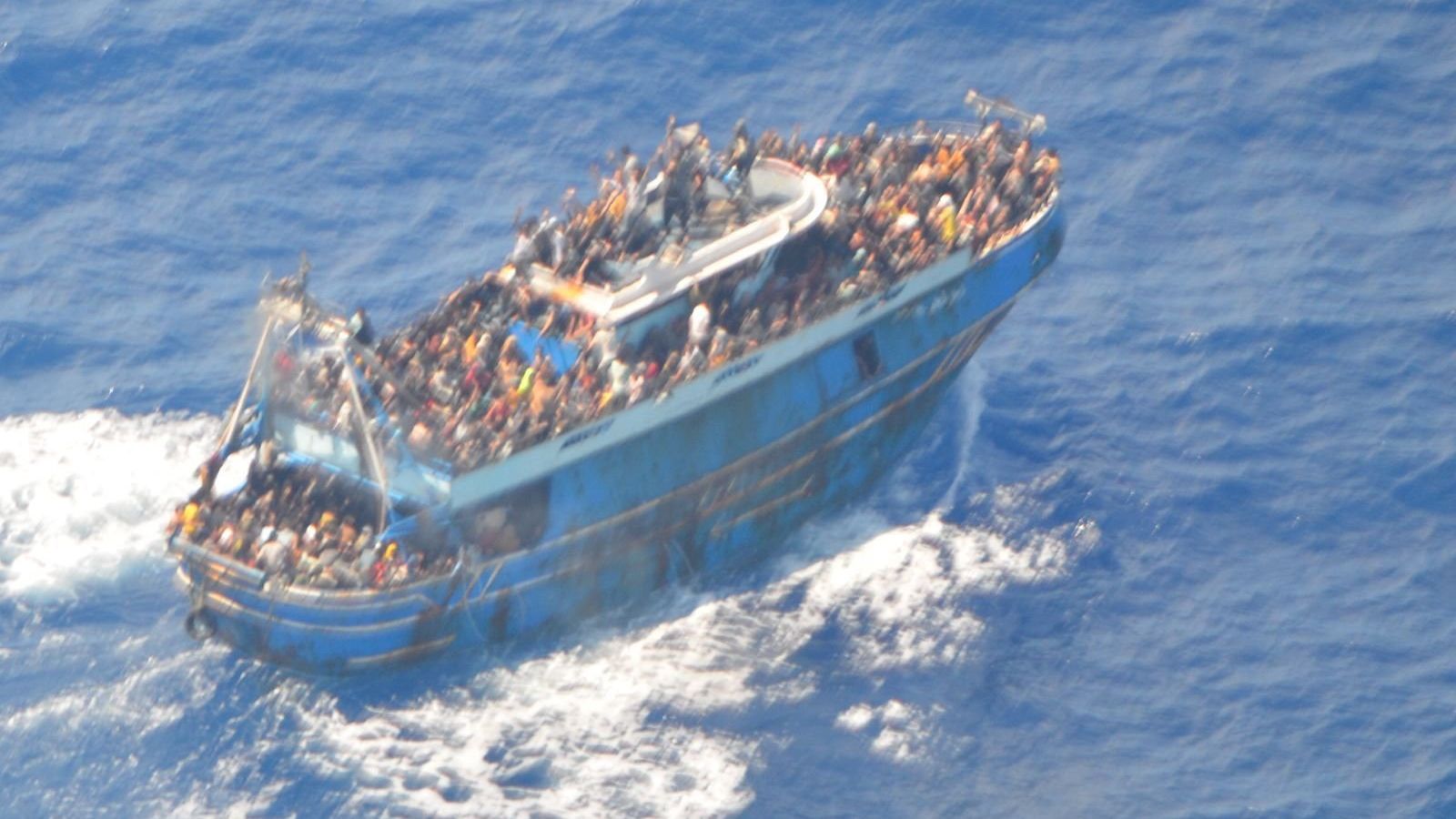A massive search operation is continuing for “hundreds” of missing migrants after at least 78 drowned when a fishing boat sank off the coast of Greece.
Officials said 104 survivors were rescued after the vessel capsized about 50 miles from the southern coastal town of Pylos.
But charity Alarm Phone, which operates a network supporting rescue operations and received frantic calls from some of those on board, said up to 750 people may have been on the vessel.
Greek officials said the boat got into difficulties when its engine stopped and it began veering from side to side.
It then capsized and sank at around 2am on Wednesday.
Shortly beforehand, Alarm Phone said it spoke to someone on board who said: “The captain left on a small boat. Please, any solution.”
They also pleaded for food and water, and said the vessel had stopped moving, according to the charity.
The search for survivors continued on Thursday morning and is expected to last until at least Friday, Greek authorities said.
Six coastguard vessels, a navy frigate, a military transport plane, an air force helicopter, several private vessels and a drone from the European Union border protection agency, Frontex, are taking part in the operation.
Officials said it was unlikely the sunken boat would be recovered because the area of international waters is one of the deepest in the Mediterranean.
Three days of national mourning have been declared by the Greek government.
Be the first to get Breaking News
Install the Sky News app for free
But Alarm Phone accused the Greek and other European authorities of failing to launch a rescue operation before the boat went down, despite being “well aware of this overcrowded and unseaworthy vessel”.
The Greek coastguard denied the claim and said those on board “refused our assistance because they wanted to go to Italy”.
Spokesperson Nikos Alexiou added that they still stayed nearby “in case it needed our assistance which they had refused”.
Survivors were brought to the port city of Kalamata by the coastguard early on Thursday. Many are being treated for conditions including hypothermia and dehydration.
Aerial pictures released by the Greek coastguard showed the 20 to 30-metre-long boat hours before it sank.
Dozens of people on the upper and lower decks were seen looking up, some with arms outstretched.
Witnesses said many more women and children were below in the hold, according to local reports.
Greek authorities, who initially said 79 people had died before later revising the figure down to 78, said they could not confirm how many people were on board.
Middle East correspondent
Some 104 people were rescued from the sinking boat, all of them men.
It hasn’t yet been confirmed that women and children were onboard, but the fear is that they were being kept below deck and so were dragged down with the boat when it capsized.
Some people have said there were 775 people onboard. However, the deputy mayor of Kalamata, the town where the rescued have been brought to, told us he thinks it was around 550 judging by the size of the boat.
Either way, the number of missing is still huge and it’s unlikely many, if any, will now be found alive.
The survivors are being looked after by Greek authorities and aid agencies, in a warehouse by the waterside in Kalamata. Some are being treated in hospital for hypothermia but most are suffering from dehydration and mental trauma.
Later they will be taken to a nearby migrant holding centre, but for now the search operation continues and the weather remains good.
The ship reportedly sank in one of the deepest parts of the Mediterranean, making a salvage operation very tricky.
The UN’s International Organisation for Migration said initial reports suggested there were up to 400 people on the vessel.
The boat is thought to have set off from the Libyan port of Tobruk and was heading to Italy.
Greek authorities said most of the migrants were from Egypt, Syria and Pakistan.
Read more:
‘This is my chance’: Inside a mass migrant rescue
On board a mission to save 600 people
How one of the worst tragedies so far unfolded in February
Click to subscribe to the Sky News Daily wherever you get your podcasts
It comes as Libyan authorities launch a major crackdown on migrants, with several thousand – including Egyptians, Syrians, Sudanese and Pakistanis – detained.
Many Egyptians have been deported to their home country through a land crossing point.
The region is one of the main routes into Europe for refugees from the Middle East, Asia and Africa.
The UN said there have been more than 20,000 deaths and disappearances in the Mediterranean since 2014, making it the most dangerous migrant crossing in the world.








